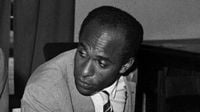Frantz Fanon, a prominent figure in the anti-colonial movement, has been brought back into the spotlight with the release of the biopic "Fanon" directed by Jean-Claude Barny. This film delves into Fanon’s transformative years at the Blida psychiatric hospital in Algeria during the early 1950s, a period marked by his revolutionary approaches to mental health care and his deep involvement in the fight for Algerian independence.
Born on July 20, 1925, in Fort-de-France, Martinique, Fanon became a psychiatrist after studying in Lyon. His groundbreaking thesis, "Peau noire, masques blancs," published in 1952, explored the psychological effects of colonialism on identity and culture. In this work, he articulated how colonized peoples often develop a sense of inferiority due to the systematic suppression of their cultural originality. This theme would resonate throughout his career and writings.
Fanon's appointment as the head doctor at the Blida-Joinville psychiatric clinic in 1953 was a turning point. Here, he encountered the dire conditions faced by patients, many of whom were marginalized and mistreated. His experiences in Algeria shaped his understanding of colonialism’s psychological impacts, leading him to implement innovative treatment methods that emphasized dignity and respect for patients.
In the film, Alexandre Bouyer portrays Fanon with a depth that captures his intellectual rigor and unwavering commitment to social justice. The narrative focuses on the years between 1953 and 1956, a crucial time when Fanon not only revolutionized psychiatric practices with collective workshops and activities like football and cinema clubs but also became actively involved with the Front de Libération Nationale (FLN), the organization leading the fight for Algeria's independence.
Fanon's methods starkly contrasted with those of his contemporaries, who often adhered to colonial paradigms that perpetuated segregation and discrimination. He aimed to dismantle the barriers between French and Algerian patients, advocating for a more humane approach to mental health care. His commitment to the FLN saw him providing clandestine medical support to fighters, further intertwining his medical practice with his political activism.
Despite his significant contributions, Fanon's life was tragically cut short. He died at the age of 36 on December 6, 1961, from leukemia while in the United States for treatment. His passing came just a few months before Algeria achieved independence, a cause for which he fought passionately.
The film "Fanon," which premiered on April 2, 2025, aims to honor his legacy by making his complex ideas accessible to a broader audience. Critics have praised Barny for his ability to present Fanon’s life with both elegance and intensity, emphasizing the importance of his revolutionary spirit and his contributions to psychiatry. However, some have noted that the film occasionally lacks the boldness required to fully capture the intricacies of Fanon’s character.
Fanon's writings, particularly "Les damnés de la terre," published in 1961, further explore the themes of decolonization and the psychological effects of oppression. In this seminal work, he argues that violence is a necessary response to colonial oppression, a perspective that has sparked much debate. His assertion that the struggle for liberation is deeply intertwined with the restoration of dignity and humanity continues to resonate in contemporary discussions about race and identity.
Historian Amzat Boukari-Yabara describes Fanon as "one of the great figures of the struggle against colonialism," particularly highlighting his role in Algeria. He points out that Fanon’s insights into the hierarchies created by colonialism and the inherent racism within its ideology remain relevant today. His work is often cited as foundational in understanding the psychological ramifications of colonial rule.
Fanon’s thoughts on identity and race are encapsulated in his famous quote from "Peau noire, masques blancs": "If the white man contests my humanity, I will show him, by weighing upon his life all my weight as a man, that I am not the 'Y a bon banania' he persists in imagining." This powerful statement underscores his belief in asserting one’s humanity in the face of dehumanization.
In addition to his psychiatric work, Fanon was also a prolific writer and journalist. He contributed to "El Moudjahid," the main organ of the Algerian revolution, using his platform to advocate for the liberation of oppressed peoples. His ability to blend theory with action makes him a unique figure in the history of anti-colonial thought.
Jean-Claude Barny’s film not only serves as a tribute to Fanon but also as a reminder of the ongoing relevance of his ideas. As racism and xenophobia resurge in many parts of the world, Fanon’s call for a new way of thinking about humanity and justice is more pertinent than ever. Barny emphasizes, "Fanon is in our past but shapes our future," highlighting the enduring impact of Fanon’s legacy in contemporary social movements.
While Fanon remains a controversial figure in France, where his critiques of colonialism and racism were historically marginalized, his influence has grown globally. His works are studied and celebrated in various academic and activist circles, proving that his insights into the human condition and the struggles for liberation continue to inspire new generations.
As audiences engage with Barny’s film, they are invited to reflect on Fanon’s life and the broader implications of his work. The film is not just a portrayal of a man but a celebration of a revolutionary spirit that sought to challenge and dismantle the oppressive structures of his time. In doing so, it serves as a vital reminder of the power of ideas and the importance of fighting for justice and equality.






